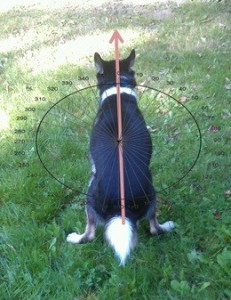
When people ask me why I like working in scientific publishing I tell them that one of the many reasons is it gives me the chance to inspire curiosity in people in some of the amazing scientific and medical research being done. This is exactly what the IgNobel Prizes are about – “honoring achievements that first make people laugh, and then make them think.”
Last night the IgNobel Prizes were awarded during a ceremony that took place at Harvard University. The winner in the Biology category was Hynek Burda and colleagues for their article ‘Dogs are sensitive to small variations of the Earth’s magnetic field’ published in Frontiers of Zoology. It certainly has piqued so many people’s curiosity – the article is the most viewed in BioMed Central’s 14 year history, which is some feat considering it was published less than a year ago.
These results were found almost as a by-product of wider research by this team into the magnetoreceptive capabilities of our canine friends. Many have long-suspected dogs of having a sensitivity to their surrounding geomagnetic field – because of their incredible homing and tracking abilities. Therefore it was behavioral adaptation that the researchers focused on, specifically defecation! Previously, research has been done extensively into magnetoreception in birds, however this is the first study of note to focus specifically on dogs – and the results were certainly of interest to the scientific community at large. Swiftly being picked up by the Annals of Improbable Research and generating waves of discussion across social media.
When I’ve spoken to people about this article it has raised lots of questions, usually the first is, “why did they do that?” Followed by a laugh, the next is “is it true?” Despite its improbability, it is– at least as far as the team’s approximately 2000 observations of dogs defecation habits. Other questions include, does this explain why some people have an innate sense of direction? Why have we never noticed this before? These are all great questions and really this is what science should be about – asking ourselves questions and generating discussion. And boy, did it generate discussion, all you need to do is check out the article’s Altmetric.com page!
The recipients of this year’s Biology awards acknowledge in their own research article that these results raise more questions, as noted in The Guardian today: “It forces biologists and physicians to seriously reconsider effects magnetic storms might pose on organisms.”
I know that the recipients of an IgNobel award also see it as an honor. The reason I know is because this is the second year in a row an article published by BioMed Central has won an award. Last year’s was for an article published in Journal of Cardiothoracic Surgery about how mice responded to opera music following a heart transplant. This time last year I was the Journal Development Editor for that journal and received an email from the lead author expressing his gratitude for the opportunity to publish in the journal and showcase his research to the world.
I have it on authority that the authors of our paper were pleased when they heard the news. We too, at BioMed Central were delighted that they were able to make such an impact and generate new and interesting discussions into a burgeoning field of research. This is just one of many ways articles we publish are acknowledged and we are extremely proud of the continuing quality and debate being generated by our open access journals.
I’d like to take this opportunity on behalf of all of us at BioMed Central to congratulate Hynek Burda and all his colleagues on their IgNobel Prize and wish them every success for the future.
Shane Canning
Latest posts by Shane Canning (see all)
- Frontiers in Zoology article wins IgNobel Prize - 19th September 2014
- Airport hazard management with the help of DNA sequencing - 11th December 2013
Comments